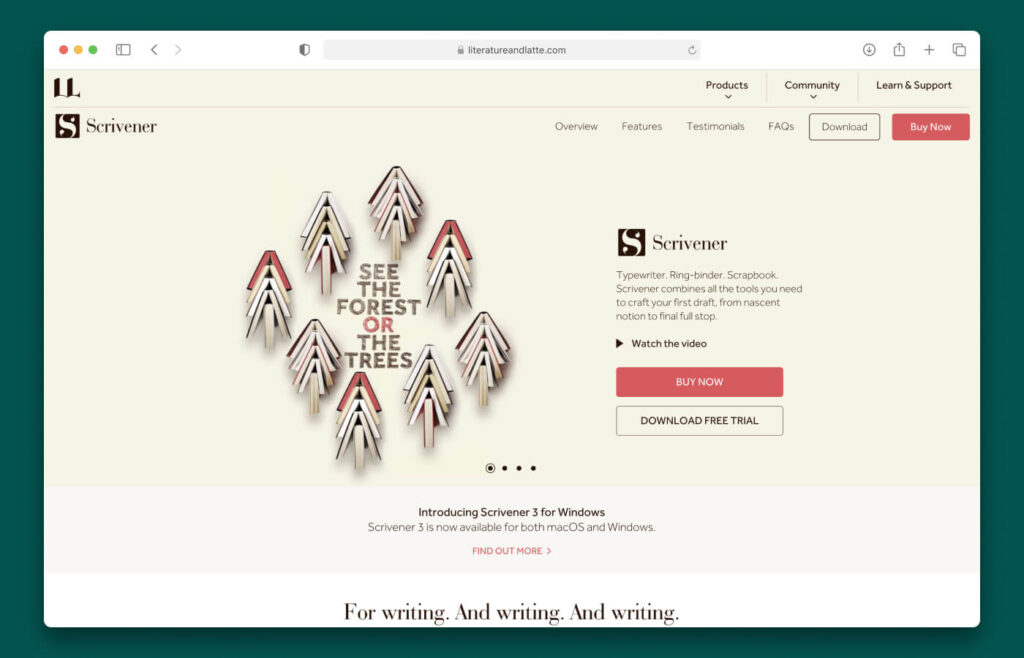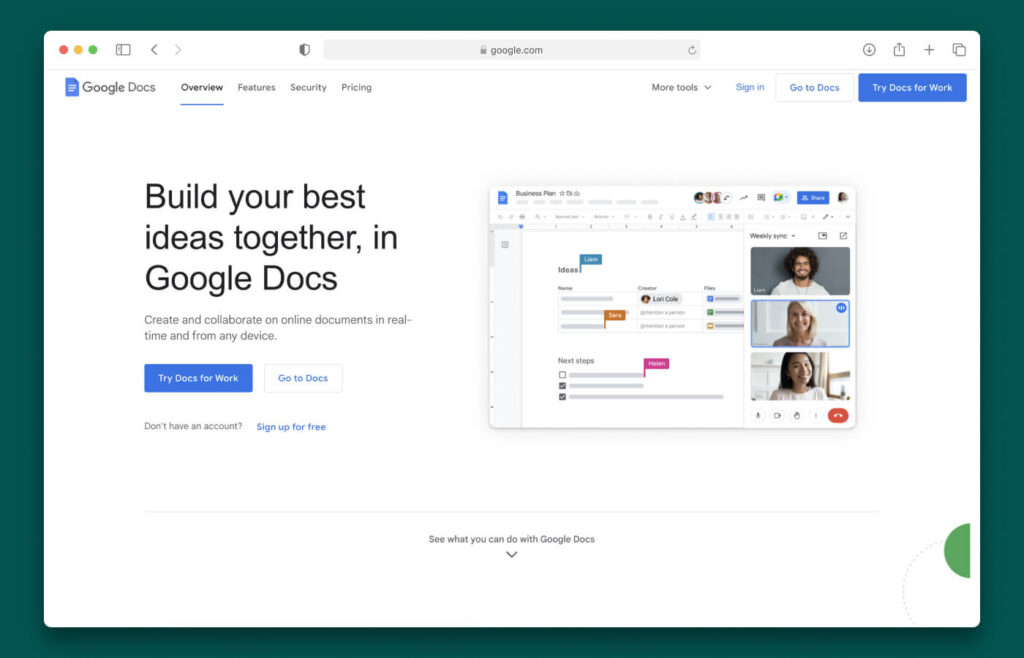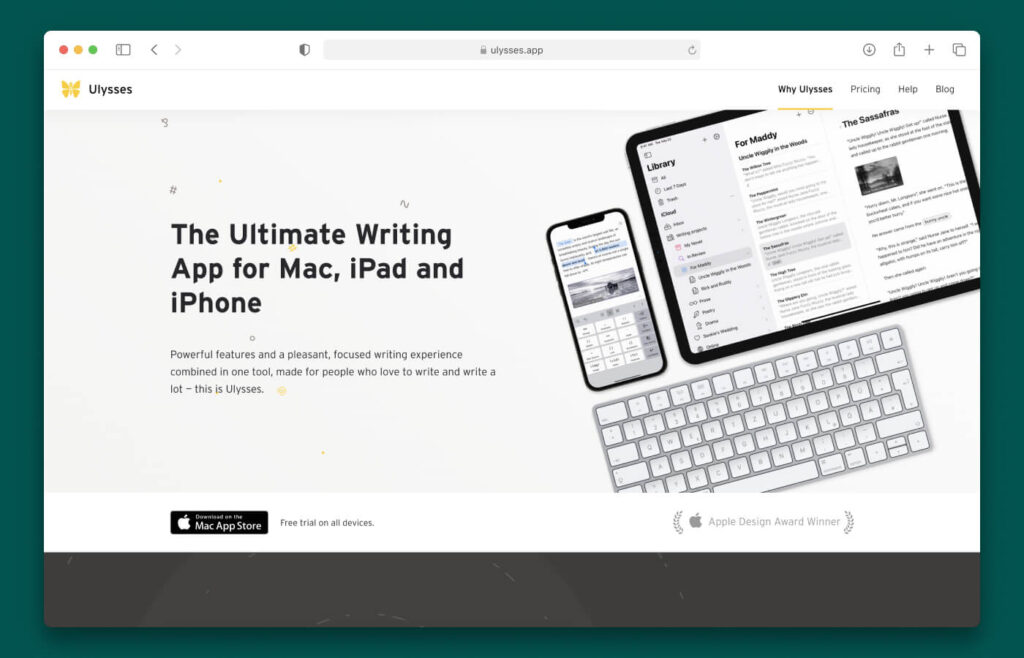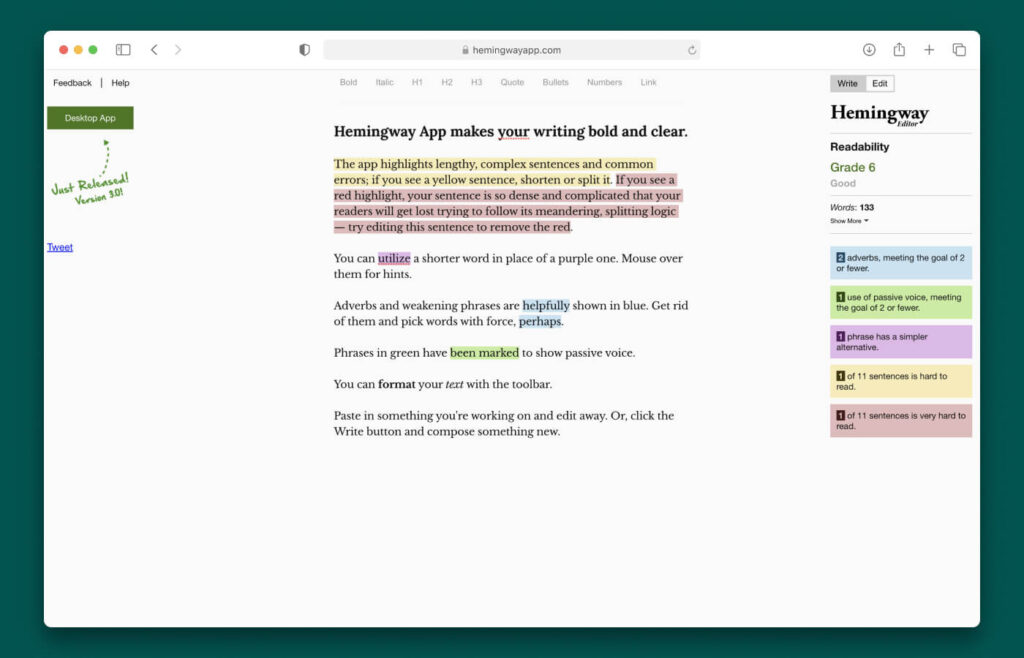There are many different options when searching for the best book writing software, and each writing tool offers its features and benefits.
The right choice can make a significant difference to your writing process.
Your choice will depend on your own writing goals and preferences.
This article will help you find the best writing tools by comparing features, book writing software cost, and ease of use.
What Is Writing Software?
Writing software programs such as Word, Google Docs, or Scrivener help professional and casual writers focus on their work. It gives the writer a clear idea of their goals and encourages focus while streamlining the writing process.
Writing software is available in standard word processors and includes additional features to aid writing. They are intended to improve your writing game, and many writers find them invaluable.
What To Look For In Writing Software?
When choosing writing software, you should consider many factors.
To begin with, you need to consider the purpose of your writing.
If you’re writing a novel, you’ll want to choose software built for and suited to this.
The software should be accessible and easy to use. You don’t want it to hinder your writing process. Instead, it should speed up the process.
Here are some things to consider:
- The features of the software
- How easy it is to navigate and use
- Organizational features
- Built-in features (productivity, autosave, distraction-free mode, etc.)
- Cost
Best Book Writing Software For Aspiring And Professional Writers
Here are seven of the best book writing software programs available. We have included both free and paid programs to suit all budgets.
We will discuss their uses, pros, and cons to provide a detailed overview of each option.
Scrivener
Best for: Writers looking to work on and edit long manuscripts.
When it comes to the best writing software for authors, Scrivener is one to consider. It’s a powerful book writing software explicitly created with authors in mind. It’s perfect for lengthy manuscripts.

The layout and setup are relatively easy to navigate and are not too overcomplicated. It features a planner system, allowing users to map out each chapter easily, and you can insert templates into the software.
The corkboard feature may also appeal to writers. You can pick writing targets, and the binder tool allows writers to combine their work into useful sections and sub-files. You can also easily set and work towards deadlines.
Scrivener features a snapshot tool highlighting areas of importance and a user-friendly interface. It contains more tools than a standard word processor, like a digital corkboard and a powerful outliner, allowing users to customize it to suit their needs and writing projects.
Sections of the writing can be rearranged easily, and there’s a distraction-free feature, allowing users to focus on their writing. As it features autosave technology, you don’t have to worry about losing work.
| Scrivener Pros | Scrivener Cons |
|---|---|
| Easy to use and navigate | No Android app |
| Distraction-free and allows the user to focus | |
| Capable of storing large manuscripts |
You can use it on both macOS, iOS, and Windows. However, Scrivener doesn’t currently have an Android app.
Price
One-time payment of $49.
Microsoft Word
Best for: Any writer looking for easy software without all the bells and whistles.
Microsoft Word is consistently popular writing software. It’s a word-processing software that’s easy to navigate.

Microsoft Word is valuable because it allows writers to track and note any changes made to their documents. Editors can leave comments within the piece without changing the text itself.
It’s easy to keep track of the word count and page numbers and to add aspects such as graphs or photographs. It features an accurate spell-check tool, and there are also built-in dictation features.
While there are many formatting options, the user must change them manually, which can be time-consuming.
A minor downside to Microsoft Word is there are no distraction-free features. Even so, it’s easy to use, autosave words as you type and is a popular option amongst many fiction writers.
Pros
- Easy-to-use software familiar to the majority of users
- Autosave feature protects your writing
- Perfect for collaborative writing
Cons
- There are no distraction-free features, and it’s not the most advanced writing program
Price
The cost of Microsoft Word is $69 per year. This cost includes other Microsoft products such as PowerPoint and Excel.
Google Docs
Best for: Smaller writing projects as the content is all stored online.
If you’re on a budget and are looking for a free program, Google Docs is helpful to consider. It’s simple in design and is pretty similar to Microsoft Word. Google Docs allows for note-taking and can be used by both Windows and Mac users.

Being completely free, you don’t have to worry about unexpected costs, making the publishing process more cost-effective. The only catch is that you need to have a Google account. Once you have set up the Google account, you can use the writing software.
Google Docs features autosave, which stores the documents to Google Drive. They can be accessed anywhere when you log into your account. Given Google Docs’ ease of use, this online word processor is a popular choice.
Editing is easy, and Google Docs users can quickly review previous drafts and add comments to the pieces. You also don’t have to worry about Google Docs taking space on your laptop, as it’s all stored online.
The only downside to Google Docs is once you surpass 3K words, the word count tracker prevents you from seeing your word count goal at the bottom of the screen. Instead, the box will need to be clicked on to access the number.
It can become a little frustrating, especially when writing an entire novel.
The spelling and grammar checker is accurate, and you can easily share the document with beta readers and editors.
Pros
- Google Docs stores all the content online. You can access it from anywhere
- You can add comments to Google Docs with ease
- Free to use
Cons
- The word count disappears from the bottom of the screen after 3K words
Price
Free
Ulysses
Best for: Writers using Mac and want distraction-free writing.
Ulysses is a fantastic book writing software best suited to Mac users. It was made specifically with authors and writers, making it one of the best writing tools. Being a writing-based software, it helps to create a distraction-free environment.

Ulysses emphasizes focus and productivity, which is essential to help you start writing. While it is word processor-based, there is more to the app, such as a customizable editor. It allows you to choose the best option for your writing style.
This can be easily linked to this software if you want to share your content on other publishing platforms, such as WordPress or Medium. The sharing process is easy, and all the software features are easy to manage and access.
The interface is not overly complicated and offers a practical split-screen view. The typewriter mode lets writers quickly focus on their work by removing all the additional features. It’s a helpful option if you need to be organized and features progress-tracking.
As Ulysses is specifically for Mac, you can’t use it with other software, and it doesn’t allow editorial collaboration, which may be an issue in the editing process.
There is no premium version of Ulysses. Instead, there’s a monthly or yearly subscription available.
Pros
- Typewriter features start focus mode to help users create a distraction-free writing environment
- Built-in proofreader and editing assistant
- Beautiful minimal interface
Cons
- Can only be used with Mac-based devices
Price
Ulysses can be paid for with a yearly subscription of $49.99. Alternatively, you can pay $5.99 a month.
yWriter
Best for: Windows users and those looking to stay focused while writing.
If you’re looking for a book writing app that helps you stay focused on writing, yWriter is an excellent option.
Out of all the writing software featured, it’s the simplest. But when it comes to book writing software, sometimes less can be more. yWriter has an easy-to-navigate set-up and is intended solely to make the writing process more manageable.
While you can’t collaborate or let others edit your work, you can set up writing templates and storyboards. It allows users to create a bigger picture regarding character and plot.
Being a book writing app, you can track your writing progress and create short descriptions and summaries for each chapter. The interface is easy to understand and is set out clearly. Users can see the number of words written per day for each section.
yWriter is easy to install. Currently, it’s only available for Windows so yWriter won’t work for Mac users.
Pros
- Allows writers to focus on their writing practice
- It’s one of the best free options available
- The app is easy to use, and writers can see their daily progress
Cons
- It’s only currently available to Windows users
Price
Free
Hemingway App
Best for: Writers who want to avoid hard-to-read sentences and grammatical errors.
The Hemingway App focuses specifically on checking style and grammar. While it’s a slightly different software compared to the other options featured, Hemingway App can be handy free writing software.

It works well when used alongside another popular word processor. It helps with sentence structure and allows writers to check the readability of their pieces, emphasizing what needs to be restructured or reworded.
Both a free version and paid subscription are available depending on your needs. The app is visual and makes mistakes and issues clear to see. This benefits visual writers and allows users to catch errors.
The color-coded notes appear on the sidebar, allowing the user to differentiate between the different grammatical and writing errors easily. Hemingway Editor flags passive voice and hard-to-read sentences.
Documents can be pasted into the app and exported where needed, or you can write directly in the app. The readability score it offers is a good indication of whether a piece of writing is suitable.
Pros
- Color-coding allows users to see the errors that require changing with ease
- Both a free version and a paid version are available
- You can use it in addition to other word processors
Cons
- Hemingway App encourages you to edit your book as you go. It can be distracting for users looking to edit the book at the end of the writing process
Price
The online editor is free to use. The paid version costs a one-time payment of $19.99.
Evernote
Best for: Writers who want software that you can use for purposes other than book writing.
If you’re a writer looking for note-taking software, Evernote could be your solution. It’s designed to collect and process notes, tasks, and schedules in one place, but you can also use it for other purposes.

Evernote allows users to create different book sections, making chapters easier to manage. You can add notes to the text to help with the editing process and share notes between users. This collaborative way of working is useful when working with others on a project.
The format of Evernote is easy to work with and makes the book writing process easier. There are two versions of Evernote, free and premium.
The subscription is worth paying for if you’re looking for access to all the book writing tools and more features. However, the free tool is still reliable and useful.
Some of the more advanced features of the premium version include templates, document searching, integrations, scanning, and notebooks. It makes writing a book more organized without getting too complicated.
You can access the app on your browser, smartphones, and apps for desktop and tablets, and it offers a distraction-free writing environment. It’s a favorite book-writing software for many people for a reason.
Pros
- Evernote offers both a free and paid version
- Project collaboration is made easy with integrations and sharing between users
- The app is easy to use
Cons
- It’s not explicitly designed with book writers in mind
Price
The online site is free to access and use. The paid subscription costs $7.99 per month.
What makes a good book writing software?
Ultimately, the type of book writing software you use as an aspiring or professional writer is your choice. While all the featured options are useful, one is likely better suited to your writing style and preferences.
We recommend trying a handful of different options before settling on one. It will help you to gain a better understanding of whether the book writing software suits your needs.
When choosing the book writing software, you will want to consider the costs, whether you would need access to certain features, or whether a free version is enough. It should help rather than hinder your writing productivity.
The most important aspect is choosing the book writing service, which allows you to stay focused on your task and assist you with the writing process.
Whether you choose simple word processors or a more advanced app, you will want to pick the right book writing software.
It’s necessary to remember the perfect book writing software is hard to come by. Each will have its pros and cons. Even so, there will be an option featuring everything you require as a book writer.
Most Common Questions
Some of the most frequently asked questions when choosing the book writing software.
What Is The Best Software For Writing A Novel?
The best software for writing a novel can change depending on personal preferences. However, the most popular options are Microsoft Word, Google Docs, Evernote, and Scrivener.
What Is The Best Platform Of Writing A Book Free?
The best free platform for writing a book will vary depending on personal preference. However, Google Docs, yWriter, and Hemingway App are useful options.
What Free Software Can I Use To Write A Book?
A handful of free software options are available for writing a book. Some of these include Reedsy, FastPencil, and Bibisco.
What Software Do Book Editors Use?
There are several types of software a book editor uses. Some popular options include ProWritingAid, Grammarly, Scrivener, Hemingway App, and Slick Write.
What Software Do Professional Authors Use?
The writing software professional authors use will depend on the author. Microsoft Word, Scrivener, and Google Docs are a few widespread and trusted options to consider.
What Program Do Authors Use To Write Novels?
Authors will use a variety of different programs. The most popular options include Ulysses, Google Docs, Scrivener, and Microsoft Word.
